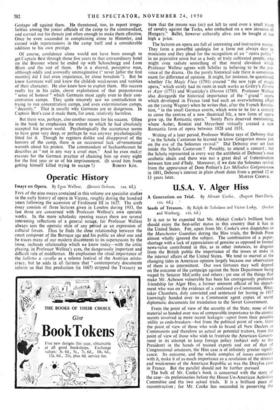Operatic History
Essays on Opera. By Egon Wellesz. (Dennis Dobson. los. 6d.) Five of the pine essays contained in this volume are specialist studies in the early history of opera in Vicnna, roughly during the hundred years following the accession of Ferdinand III in 1637. The sixth essay consists of three lectures given in London during 1933, the last three are concerned with Professor. Wellesz's own operatic works. In the more scholastic opening essays there are several interesting reflections of a general natKe, for Professor Wellesz always sees the operatic style of any period as an expression of cultural forces. Thus he finds the close relationship between the court composer of the Baroque age and his public an ideal one and he traces many of our modern discofitents to its supersession by the loose, inchoate relationship which we know today—with the critic playing, in Professor Wellesz's eyes, the dangerously important and difficult role of middleman. He emphasises the ritual importance of the balletto a cavallo as a solemn festival of the Austrian aristo- cracy, but he adds in all fairness that "contemporary documents inform us that this production (in 1667) stripped the Treasury so bare that the means-. was (sic) not left to send even a small troop of cavalry against the Turks, who embarked on a new .invasion of Hungary." Ballet, however culturally alive, can be bought at too high a price.
The lectures on opera are full of interesting and instructive matter. They form a powefful apologia for a form not always dear to musicians and they plead for the recognition of an "opera public" in no pejorative sense but as a body of truly cultivated people, who might even radiate something of that moral elevation which Professor Wellesz agrees with Schiller in believing to be the pro- vince of the drama. On the purely historical side there is sometimes room for difference of opinion. It might, for instance, be questioned whether The Magic Flute (1791) created "the new type of magic opera," which surely had its roots in such works as Gretry's Zemire et Azor (1771) and Wranitzky's Oberon (1789). Professor Wellesz also disregards the historical importance of the " grand " opera which developed in France (and had such an overwhelming effect on the young Wagner) when he writes that, after the French Revolu- tion, "in the small German courts, which were to be for a century to come the centres of a new theatrical life, a new form of opera grew up, the Romantic opera." Surely Paris deserved mentioning, where Auber, ROssini and Meyerbeer virtually created a new Romantic form of opera between .1828 and 1831.
Writing of a later period, Professor Wellesz says of Debussy that "in the Schola Cantorum he learned to know Gregorian music just on the eve of the- Solesmes revival." Did Debussy ever set foot inside the Schola Cantorum ? Possibly, to attend a concert ; but the Schola represented in every way the antithesis of Debussy's own aesthetic ideals and there was not a great deal of fraternisation between him and d'Indy. Moreover, if we date the Solesmes revival from the appearance of Dom Pothier's Les Melodies Gregoriennes in 1881, Debussy's interest in plain chant dates from a period 12 or














































































 Previous page
Previous page